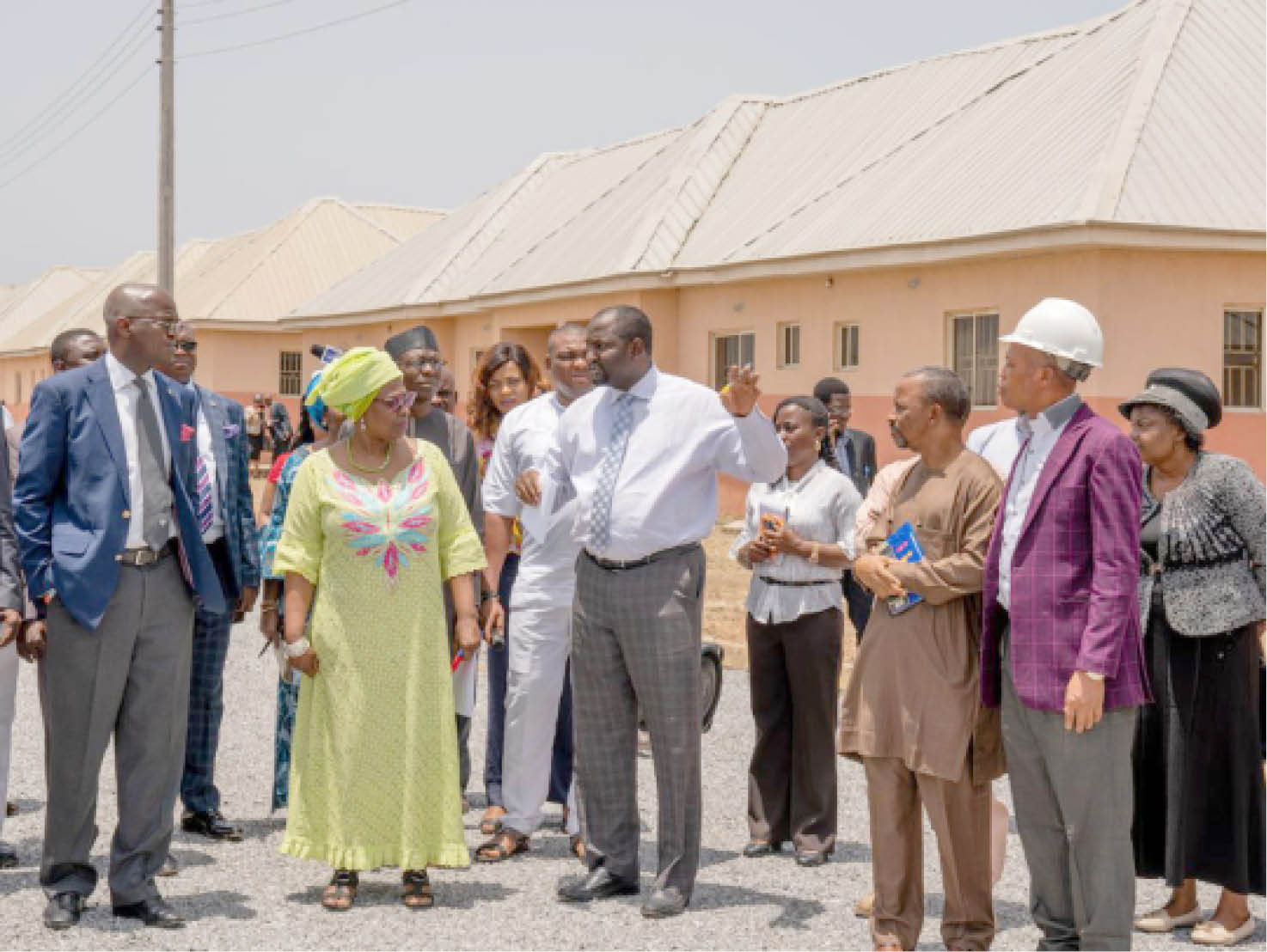N3.7bn Zuba mass housing ready by August – FG
The first phase of the Federal Housing Authority (FHA) Zuba Mass Housing Scheme project which began nine months ago will be commissioned in August this year. The Managing Director of FHA, Prof. Muhammad Al-Amin, announced this during a recent inspection of projects in Abuja by the Minister of Power, Works and Housing, Mr. Babatunde Fashola. […]

From left: Minister of Power, Works & Housing, Mr Babatunde Fashola, SAN, Director, Public Private Partnership in the Ministry, Mrs Eucharia Alozie (2nd left) and others at the Federal Mortgage Bank of Nigeria Ministerial Pilot Housing Scheme, Gwagwalada during the Minister’s inspection of on going Federal Housing Projects in Abuja recently.
The first phase of the Federal Housing Authority (FHA) Zuba Mass Housing Scheme project which began nine months ago will be commissioned in August this year.
The Managing Director of FHA, Prof. Muhammad Al-Amin, announced this during a recent inspection of projects in Abuja by the Minister of Power, Works and Housing, Mr. Babatunde Fashola. He said N3.7bn had been committed so far into the Zuba housing project.
The project in Zuba is a 764-unit of houses and is expected to be delivered to the masses by August.
The projects are among many others by the Federal Government spread across the country to deliver affordable houses to Nigerians.
Speaking with newsmen after the inspection of the projects, Mr. Fashola pointed out that the three sites represented the different ways government was addressing housing development in the country.
The minister, who said the FHA had not compromised on quality, noted that the project was the first set of buildings the FHA embarked on under the present dispensation, assuring that the ongoing projects would meet global minimum competitive housing standards for pricing when they were finished.
“They are not luxury apartments as you can see; they are mass housing projects, 764 of them, two and one-bedroom flats,” he said, adding that the aim of government was to get what would fit into the pocket of the ordinary man who “President Buhari and the Nigerian Government are very determined to reach.”
“It will meet those standards of safety; it will meet those standards of protection from water, wind and flooding. It will be efficient, but it is not luxury. You can now create your own luxury as you furnish, but it will meet the global minimum competitive standards for public housing in terms of quality and in terms of finishing,” he assured.
Fashola expressed satisfaction with the quality of work at the site, as well as the employment opportunities it provided, saying, “I met some carpenters who were helping to prepare the form work for houses on this site and they said they didn’t have work; they were roadside carpenters before, but the site provided opportunity for them to get work; which is what government wants to achieve; to use housing to stimulate employment.”
Fashola added that the report available to him showed that the site alone had employed 10,000 persons: builders, welders, suppliers and so on, and that there was assurance that employment would still continue as the houses reached the fitting and painting stages as “there is still a lot of work to be done.”
The minister explained that the type of buildings at the site were the condominium variety, different from the bungalows that most Nigerians were used to, expressing delight that many people had been afforded opportunity to work at different levels: supply of building materials; granite, cement, laterite, water and so on, adding that, “This is the construction ecosystem that we want to see across the country.”
Also speaking to newsmen, the Managing Director of FHA, Prof. Muhammad Al-Amin, said, “We have also taken measures that the end users of this projects are common Nigerians, as we are encouraging all sorts of groups to form housing cooperatives as it will help during housing allocations, and we are ensuring that it is those common Nigerians that are yarning for accommodation that will benefit from these projects and that is why we chose this location for this project. It is not in Maitama or Asokoro.”
Some workers and support staff at the site expressed joy over the project, saying it had helped a lot of unemployed people to return to work and help their families.
An engineer at the site, Kunle, said those who had no jobs, such as masons, carpenters and iron benders, were now busy doing something and earning a living.
A security man, Jacob Danladi, said, “We appreciate this government. I am very happy with the government over this project. I was employed last year. I want the project to continue because it is helping a lot of people.”
Another artisan who gave his name as Peter, expressed delight that he now had a job to help himself and his family, and therefore, urged government not stop the project “because it is helping us.”
Rosemary, a food vendor, described the project as people-oriented in terms of the opportunities it has afforded people to get jobs.
She said, “This project is very nice, everybody is working; I am doing business; selling food here to help workers. I make money to take care of my children. I am happy with the project going on here. God has already blessed this government. I only pray that they continue because they are helping me in my business.”
